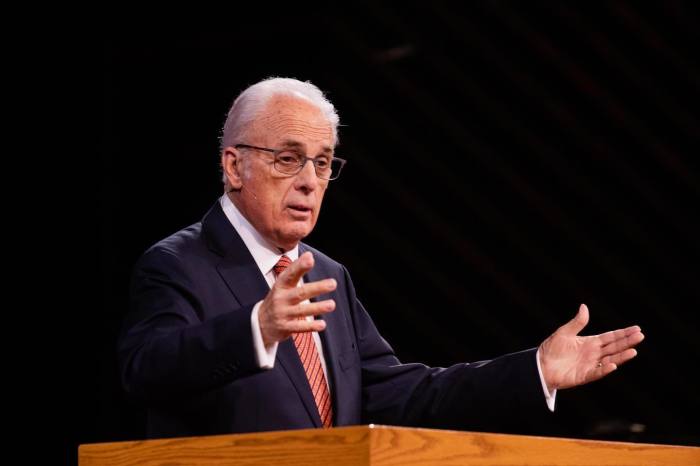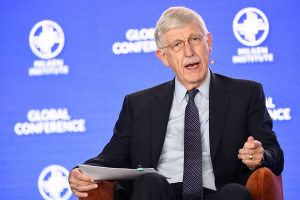Beth Moore, doctor criticize John MacArthur for claiming mental illness isn’t real

Pastor John MacArthur is facing withering criticism from some doctors, Christian mental health experts and outspoken Evangelical figures like Beth Moore following his comment saying there is no such thing as mental illness.
“This is such a bad, dangerous take. As a pediatrician, me, and the people I work with are committed to children. This conspiracy theorist language re ADHD treatment making children ‘addicts’ or ‘criminals’ is wrong, & has no data to support it,” Dr. Stephen Patrick, incoming professor and chair of health policy and management at Emory University’s Rollins School of Public Health, said in a statement on X. “Beyond that it’s another attack on pediatricians/healthcare providers … and those attacks are taking a tangible toll on pediatricians/nurses/healthcare providers.”
Though more than one in five U.S. adults live with a mental illness, according to the U.S. Centers for Disease Control and Prevention, and more than one in five youth (ages 13-18) either currently or at some point during their life have had a seriously debilitating mental illness, MacArthur, who leads Grace Community Church in Sun Valley, California, claimed just days before the start of Mental Health Awareness Month in May that mental illness isn’t real.
Citing arguments presented by clinical psychologist Bruce E. Levine in his book A Profession Without Reason and The Myth of Mental Illness by the now-deceased Hungarian-American psychiatrist Thomas Szasz, MacArthur urged parents not to believe in “noble lies” he alleges are being supported by the pharmaceutical industry so they can sell medication to the public that turn children into drugs addicts and potential criminals.
“The major noble lie is there is such a thing as mental illness. Now, this isn't new. You have Thomas Szasz … writing a book, who was a psychiatrist, on The Myth of Mental Illness. There's no such thing as PTSD. There's no such thing as OCD. There's no such thing as ADHD. Those are noble lies to basically give the excuse to, at the end of the day, to medicate people. And Big Pharma is in charge of a lot of that,” the pastor said during a panel discussion at Grace Church of the Valley last Thursday.
“Take PTSD for example, what that really is, is grief. You are fighting a war you lost. Your buddies, you have a certain amount of survival guilt because you made it back, they didn't. How do you deal with grief? Grief is a real thing. But grief is part of life, and if you can't navigate grief, you can't live life,” he added.
Christians who struggle with their mental health, like retired law enforcement officer Sharon Kroger, called MacArthur’s arguments a “slap in the face” to veterans and law enforcement officers.
“Thanks for the slap in the face for every veteran, law enforcement and fire personnel, dealing with the life-long effects of PTSD. There is the body, mind, and soul. Know your area of training, knowledge, and expertise. I've had five years of therapy and professional assistance,” Kroger wrote on X. “Arrogance is never a good look! Sounds demonic. God bless!”
Moore noted that her husband struggles with PTSD and suggested MacArthur, who is 84, might have had a senior moment when he made the comments.
“I’ve had several very serious conversations with my daughters & my board concerning my public voice in my aging when filters naturally thin & we’re at greater risk of saying more than we should,” Moore wrote on X. “Please love & respect him enough to sift what should & shouldn’t be publicized. There is simply no way he could know, for example, what my husband has endured over being in a fire with his brother when he was a toddler and watching him burn and not acknowledge the reality of PTSD.”
Former Planned Parenthood clinic director turned pro-life CEO, Abby Johnson, who is also a trained Christian counselor, condemned MacArthur’s comments as well.
“John MacArthur just publicly proclaimed that he has zero understanding of PTSD or any other mental health disorder. I have my doctorate in Christian counseling and anyone reading this who is struggling, this is NOT truth,” she noted on X. “This is NOT what Jesus wants for you. He wants health and wholeness for your mind, body, and spirit. That often includes therapy and sometimes medication. And that’s OKAY. Please do not feel ashamed for seeking health. Seeking help is the courageous thing to do.”
Gavin Ortlund, former senior pastor of the 100-member First Baptist Church of Ojai in Ojai, California, who now ministers full time via his Truth Unites channel on YouTube, said MacArthur’s ideology on mental health is “destructive.”
He further noted that MacArthur’s ideology on mental health is common among American Evangelical culture and it’s something that needs to be better addressed.
“Among American Evangelicals, we have to rehabilitate the doctrine of common Grace. This is a part of our heritage that we've kind of fallen away from. We often have a kind of underdeveloped or sort of malnourished doctrine of common grace,” he said in a video response.
Ortlund described common grace as the grace God gives to everyone regardless of whether they are in a “saving relationship with Him.”
“I think the fruits of that neglect of this doctrine are manifest in many ways,” asserted.
“ ... sometimes we have this, like this this lack of common Grace almost makes us try to super spiritualize everything and it's not healthy. One example of this, I would say, would be the sense that there's something wrong with learning from non-Christians,” Ortlund added.
“There’s so much that comes to us from common grace. The technology that enables me to record this video and you to watch it is the fruit of common grace. The clothing that I'm wearing was stitched together by common grace. The room that I'm sitting in was built by the knowledge of common Grace and medication and professional help is available to people who struggle with mental illness, and it is valid because of common Grace.”
Large scale studies like The State of Religion & Young People 2022: Mental Health–What Faith Leaders Need to Know, which was conducted by the Springtide Research Institute, point to a positive relationship between religion, spirituality and mental health.
The study found that while religion and spirituality "can be strong antidotes to much of what contributes to mental-health struggles among young people" and that "people who are religious are better off mentally and emotionally," only 35% of the respondents said they are connected to a religious community.
While the study indicates that religion can have a positive impact on mental health, Josh Packard, Springtide’s executive director, notes in the report that "solutions to mental-health struggles are more complicated than just 'give young people more religion,'" as about 20% of "very religious" respondents report they are "not flourishing."
"The reality is that without addressing mental-health issues, a young person who is mentally and emotionally unwell won’t be able to really engage with or understand the depth, beauty, power, awe, and love that can come with religion and spirituality," Packard wrote. "As Jeff Neel, the executive director of Northern Colorado Youth for Christ, puts it, 'Young people have to heal and belong before they can hear and believe.'"
Other studies previously highlighted by The Christian Post, show how ill-equipped many churches are in ministering to Christians who struggle with
In a subreddit of more than 40,000 anonymous former Christians, many shared stories about how they suffered as their Evangelical churches and family members urged them to pray away conditions such as bipolar disorder, anxiety and ADD before they were finally able to get help. Some said they never got the help they needed until they were adults.
“As a TEENAGER I said to the Christian I looked up to, ‘Hey, I hear voices and see shadow people everywhere, also I want to kill myself,’" a former Christian, who was later diagnosed with schizoaffective disorder, wrote. "And I was told it was just ‘spiritual warfare’ and Satan fighting for my soul. I was told to NOT seek therapy because therapists work for the devil to drive people away from the Lord."
Contact: leonardo.blair@christianpost.com Follow Leonardo Blair on Twitter: @leoblair Follow Leonardo Blair on Facebook: LeoBlairChristianPost





























